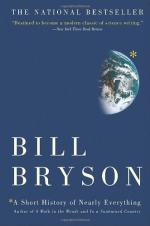
|
| Name: _________________________ | Period: ___________________ |
This quiz consists of 5 multiple choice and 5 short answer questions through Part 3, Chapter 9.
Multiple Choice Questions
1. According to the Reverend William Buckland, the biblical reference to "in the beginning" with regards to the formation of Earth could refer to:
(a) Exactly seven days.
(b) Myths and legends.
(c) Millions and millions of years.
(d) A particular era.
2. In addition to being a seventeenth-century astronomer, Christopher Wren designed:
(a) Eyeglasses.
(b) Clothes.
(c) Cathedrals.
(d) Swords.
3. Pluto is the first planet to be discovered by an:
(a) Australian.
(b) Argentine.
(c) Austrian.
(d) American.
4. Halley believed that once scientists figured out the distance from the sun to the Earth, they could then calculate what?
(a) Weight of Earth.
(b) Distances to distant stars.
(c) Distances to other planets.
(d) Weight of the sun.
5. James Hutton believed that the natural forces forming the geology of Earth are:
(a) Impossible to classify.
(b) Still at work.
(c) Random and unpredictable.
(d) Now extinct.
Short Answer Questions
1. Many scientists suspect that Pluto is just a comet of the:
2. A hundred years before Einstein's math analyses confirmed the existence of atoms, this self-educated scientist suggested everything is made up of tiny, unchangeable particles:
3. Which of the following is not a major geological era?
4. Arranged side by side, how many atoms can fit across the width of a typical human hair?
5. James Hutton was a geologist who wondered why:
|
This section contains 253 words (approx. 1 page at 300 words per page) |

|




